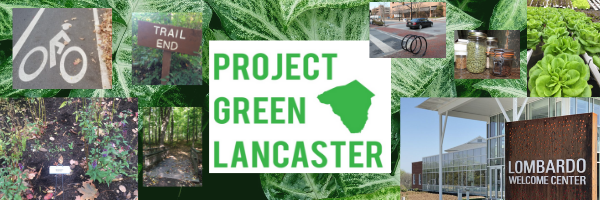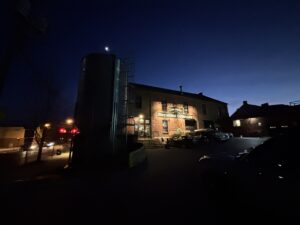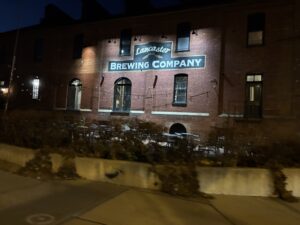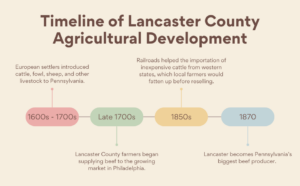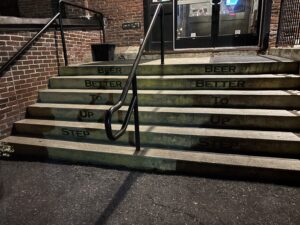Lancaster Brewing Company is leading the way in eco-friendly brewing through its sustainability efforts.
Lancaster Brewing Company has been very committed to implementing environmentally friendly practices in order to become a sustainable operation. These efforts are in collaboration with the City of Lancaster’s Green Infrastructure Plan, designed to improve urban water management and reduce pollution.
The south-facing exterior of Lancaster Brewing Company features an array of green infrastructure elements, including rain gardens and vegetated curb extensions, a patio with permeable pavers, a 750-gallon cistern that collects rainwater, and porous paver parking spaces. These installations not only enhance the brewery’s aesthetic appeal but also play a crucial role in managing stormwater, helping prevent millions of gallons of stormwater from flowing into the Chesapeake Bay.
One of the standout features of the brewery’s sustainability efforts is its 750-gallon cistern, known as “The Lancaster Gateway Bundle.” Designed by Ausin+Mergold, the cistern collects rain, which is then used to water flowers and other greenery on the brewery’s patio. Aesthetically, the cistern symbolizes a traditional grain silo, paying homage to Lancaster’s rich brewing history and deep agricultural roots.
Lancaster’s agricultural roots
When European colonists first settled in Pennsylvania, they brought their cattle, fowl, sheep, and other domesticated animals. At first, the farmers raised their cattle for their own and local use. In the late 1700s, they began supplying beef to the growing market in Philadelphia. The invention of railroads in the 1850s helped the importation of inexpensive cattle from western states, which local farmers would fatten up before reselling. By the 1870s, Lancaster County became Pennsylvania’s biggest beef producer. Dairy farming also grew significantly, growing into a large milk industry in the 20th century from its beginnings as seasonal butter production.
Lancaster Brewing Company has partnered with GREENCROWN Energy, their energy management partner, to make their brewing process more energy-efficient and environmentally friendly. Through this partnership, they have acquired Renewable Energy Certificates (REC), which are documents that show proof of using renewable energy. Each REC is made when one megawatt-hour (MWh) of renewable electricity is produced and sent to the power grid. Because the United States Environmental Protection Agency cannot tell where the electricity in the grid comes from, RECs help to track and prove the use of renewable energy. The credits support wind-powered electricity production, allowing the brewery to produce its food and beer with 100% renewable energy.
Renewable Energy Certificates
A Renewable Energy Certificate (REC) is “proof” that one megawatt-hour (MWh) of renewable energy has been added to the electricity grid. A REC includes details such as the type of renewable energy, where it was produced, and when it was made. The electricity grid doesn’t show where energy comes from, so RECs help to track and prove the use of renewable energy. They are legally recognized in the United States and are supported by governments and organizations. RECs allow businesses to claim they are using renewable energy. Because they are “proof” of renewable business practices, RECs are an important tool for supporting green energy efforts.
In addition to energy conservation, Lancaster Brewing Company focuses on waste reduction through innovative recycling practices. They recycle spent grains, a byproduct of the brewing process, by providing them to local farmers for cattle feed or using them as natural fertilizer. This not only reduces waste but also supports the local agricultural community. Some of the grains are also donated to Two Pups Pastries, a company that uses them to make dog treats, ensuring that nothing goes to waste. The brewery also recycles its yeast for up to five or six generations, reducing the need for new yeast production and minimizing their environmental impact.
Two Pups Pastries
Located at 347 N Plum Street in Lancaster, Pa., Two Pups Pastries is a specialty bakery that offers greats for both humans and pets. They specialize in all-natural, lab-tested, gourmet dog treats. They advertise using all-natural ingredients so humans and pets can get the freshest products possible. Two Pups Pastries is housed in the same area as other culinary-focused businesses, such as My Vegan Baker and The Pie King, which helps to foster a creative food community. For more details, you may consider checking out their Facebook page, calling them at (717) 817-5474, or visiting to explore the bakery.
To provide transparency, Lancaster Brewing Company offers guided tours of their facility, allowing visitors to see their sustainability efforts in action. However, due to the ongoing construction of a new distillery operation, the tours are temporarily unavailable.
These efforts not only have environmental impacts but also effects on the community and environment. Through their efforts, local communities are given the opportunity to learn about the importance of green infrastructure and how it impacts their lives and cities. Planting flowers and greenery on the patio and in the rain garden also beautifies the area, attracting more customers and providing the perfect backdrop for potential Instagram photos.
Rain gardens
Rain gardens are shallow, landscaped areas designed to collect rainwater. Rain gardens are a cost-effective and attractive way to reduce stormwater runoff and filter pollutants while also providing a habitat for butterflies, birds, and other wildlife. This filtration can prevent pollutants from entering waterways, which then can improve the overall water quality. There are also more advanced rain gardens, called bioretention systems, that have specialized drains and amended soils. Proper planning and placement are crucial in preparing a rain garden. Checking for underground utilities and avoiding unsuitable areas for digging are key to ensuring the effectiveness and safety of a rain garden.
Through these efforts, Lancaster Brewing Company continues to set a high standard for sustainable business practices in the brewing industry. Their initiatives not only benefit the local community and environment, but also inspire others to adopt similar practices, contributing to a healthier planet for future generations.
References
About – Lancaster Brewing Co. (n.d.). Lancaster Brewing Co. https://www.lancasterbrewing.com/home/brewery/
